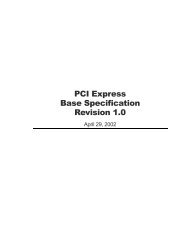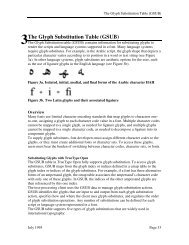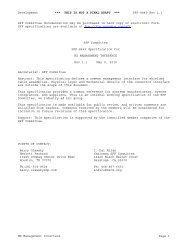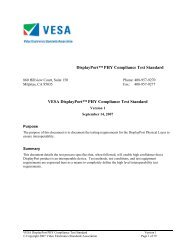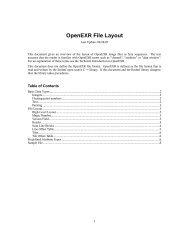[MS-ASCMD]: ActiveSync Command Reference Protocol Specification
[MS-ASCMD]: ActiveSync Command Reference Protocol Specification
[MS-ASCMD]: ActiveSync Command Reference Protocol Specification
Create successful ePaper yourself
Turn your PDF publications into a flip-book with our unique Google optimized e-Paper software.
Value Meaning Cause Scope Resolution<br />
1 Success. Server successfully<br />
completed command.<br />
Global<br />
None.<br />
2 Invalid<br />
meeting<br />
request.<br />
The client has sent a<br />
malformed or invalid item.<br />
The request is referencing<br />
an item other than a<br />
meeting request, e-mail,<br />
or calendar item.<br />
The request points to an<br />
appointment in which the<br />
user is the organizer.<br />
The InstanceId element<br />
(section 2.2.3.78.1)<br />
specifies an e-mail<br />
meeting request item.<br />
The InstanceId element<br />
specifies a nonexistent<br />
instance or is null.<br />
Item<br />
Stop sending the item. This is not a<br />
transient condition.<br />
3 An error<br />
occurred on<br />
the server<br />
mailbox.<br />
Server misconfiguration,<br />
temporary system issue,<br />
or bad item. This is<br />
frequently a transient<br />
condition.<br />
Global<br />
Retry the MeetingResponse command.<br />
If continued attempts fail, synchronize<br />
the folder again, and then attempt the<br />
MeetingResponse command again. If<br />
it still continues to fail, make no<br />
changes.<br />
4 An error<br />
occurred on<br />
the server.<br />
Server misconfiguration,<br />
temporary system issue,<br />
or bad item. This is<br />
frequently a transient<br />
condition.<br />
Global<br />
Retry the MeetingResponse command.<br />
If continued attempts fail, synchronize<br />
the folder again, and then attempt the<br />
MeetingResponse command again. If<br />
it still continues to fail, make no<br />
changes.<br />
2.2.3.152.9 Status (MoveItems)<br />
The Status element is a required child element of the MoveItems element in MoveItems<br />
command responses that indicates the success or failure the MoveItems command request (section<br />
2.2.2.10.1). If the command failed, Status contains a code indicating the type of failure.<br />
All elements referenced in this section are defined in the Move namespace.<br />
<strong>Command</strong><br />
request/response<br />
Parent elements<br />
Child<br />
elements<br />
Data type<br />
Number<br />
allowed<br />
MoveItems command<br />
response (section<br />
2.2.2.10.2)<br />
Response<br />
(section<br />
2.2.3.130.4)<br />
None<br />
unsignedByte ([<strong>MS</strong>-<br />
ASDTYPE] section 2.7)<br />
1…1<br />
(required)<br />
The following table lists the status codes for the MoveItems command (section 2.2.2.10). For<br />
information about the scope of the status value and for status values common to all <strong>ActiveSync</strong><br />
commands, see section 2.2.4.<br />
[<strong>MS</strong>-<strong>ASCMD</strong>] — v20110315<br />
<strong>ActiveSync</strong> <strong>Command</strong> <strong>Reference</strong> <strong>Protocol</strong> <strong>Specification</strong><br />
Copyright © 2011 Microsoft Corporation.<br />
Release: Tuesday, March 15, 2011<br />
227 / 369


![[MS-ASCMD]: ActiveSync Command Reference Protocol Specification](https://img.yumpu.com/34211856/227/500x640/ms-ascmd-activesync-command-reference-protocol-specification.jpg)
![[MS-DFSRH]: DFS Replication Helper Protocol Specification](https://img.yumpu.com/51326226/1/190x245/ms-dfsrh-dfs-replication-helper-protocol-specification.jpg?quality=85)
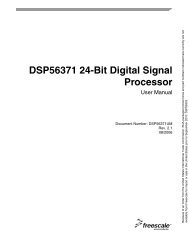
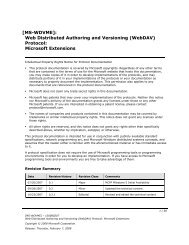
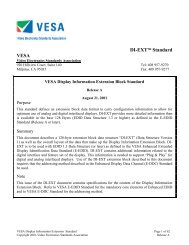
![[MS-VDS]: Virtual Disk Service (VDS) Protocol Specification](https://img.yumpu.com/50743814/1/190x245/ms-vds-virtual-disk-service-vds-protocol-specification.jpg?quality=85)
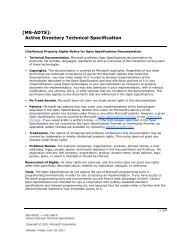
![[MS-GPSI]: Group Policy: Software Installation Protocol Extension](https://img.yumpu.com/50703911/1/190x245/ms-gpsi-group-policy-software-installation-protocol-extension.jpg?quality=85)

![[MS-GPPREF]: Group Policy: Preferences Extension Data Structure](https://img.yumpu.com/50206932/1/190x245/ms-gppref-group-policy-preferences-extension-data-structure.jpg?quality=85)
